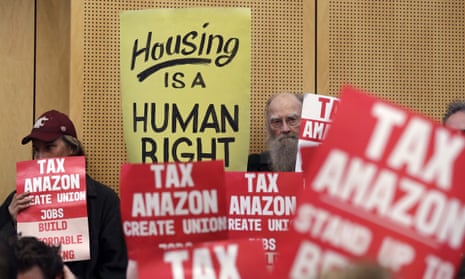A parade of hardhat union workers and threats from hometown-behemoth Amazon did not stop Seattle leaders from passing on Monday a “head tax” meant to fund housing projects and homeless services.
A watered-down version of the tax, which will charge the city’s largest employees $275 per worker annually, is now expected to be enacted by Seattle’s mayor, Jenny Durkan. The tax is projected to generate about $48m a year to address a housing crisis spurred on by Amazon’s rapid growth.
A broader tax proposal prompted the tech company to halt construction on one Seattle office tower and put off a lease of another tower. Union construction workers marched on city call to protest the tax, which also drew opposition from business interests.
Socialists and self-styled members of the “Seattle silent majority” squared off prior to Monday’s vote. Neither side supported the compromise, and most speakers blamed city leaders for an escalating homelessness crisis that has seen city sidewalks, parks and roadsides packed with tents and shacks.
About 60% of the tax revenue will go to new housing projects for low and middle-income Seattle residents. The remainder would go to homeless services, including shelter beds, camps and overnight parking.
On Friday, city council members approved a proposal to charge the large employers in the city $500-per-employee. Following a veto threat from Durkan, the council decreased the total charge and included a five-year sunset provision over objections of supporters of the original legislation.
“Do not capitulate to [Amazon CEO Jeff] Bezos’ bullying,” Emily McArthur, an organizer with Socialist Alternative, demanded of the council. “Tax Amazon. Be leaders.”
Amazon has driven Seattle’s economy in recent years, drawing thousands of well-paid workers to the region. The “Bezos Boom” has proved a mixed blessing, though, as middle-income residents have been priced out of Seattle. The city council president, Bruce Harrell, spoke to a growing “fear of what this city is becoming”.
The move by Amazon to create HQ2 – a second headquarters elsewhere – has stoked fears that Seattle’s liberal politics will turn off the company. Threats from Amazon that it will halt growth in Seattle in favor of other offices lend credence to those concerns.
In a statement issued Monday, Vice President Drew Herdener said the company would resume construction on the downtown tower but was considering whether Seattle is the place for it to grow.
“We remain very apprehensive about the future created by the council’s hostile approach and rhetoric toward larger businesses, which forces us to question our growth here,” Herdener said.
Marilyn Strickland, president and CEO of the Seattle Metro Chamber, voiced business leaders’ opposition to the tax.
“Taxing jobs will not fix our region’s housing and homelessness problems,” said Strickland, who went on to praise Durkan for her role in the compromise.
For her part, Durkan said the limited tax would “address our homelessness crisis without jeopardizing critical jobs.”
The tax passed by a veto-proof unanimous vote. As it passed, socialists pushing for a larger tax broke out in a chant: “We’ll be back for more! We’ll be back for more!”
